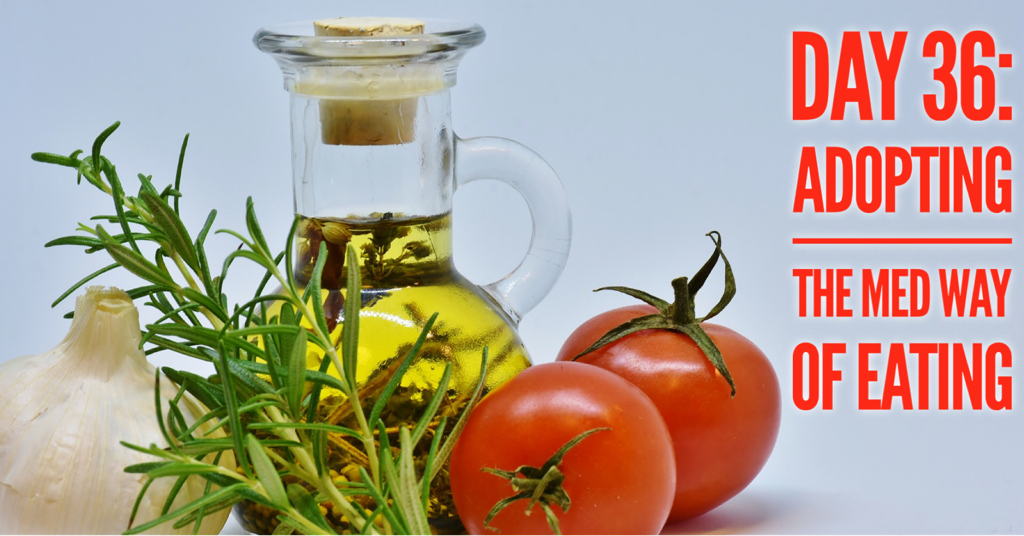Day 36: Adopting the Med Way of Eating
Failure.
In our effort to be healthy, we will stumble upon failure time and again. And when we do, instead of banging our head on the wall or hating our inconsistencies and weaknesses, I invite everyone to embrace failure.
Why?
Because when we do, we come close and smell “failure” and scrutinize the reasons why we failed. And we realize that failure is not bad at all.
First, we may discover that we’ve been aiming at something unattainable or unrealistic. Remember, we aim not just to become healthy, but also happy, and holy (whole).
If our goals are too steep and we end up being depressed all the time and scathing words are on our tongue ready to fire at anyone who crosses our path, we are treading an unhealthy path.
Second, we may have focused on just one thing. Weight loss is not everything. Achieving health cannot be pinned on one parameter—food. A lot of times, some people lose weight by extreme dieting but look like crap. Some people stress so much about food intake that they lose energy to exercise.
When I probed deeper into the Mediterranean Diet I realized that it is more than a diet and a checklist. It is a pattern of eating, a lifestyle, and a way of living.
The people who truly adopted this way of life have room for sweets and rich food. But they consume these on certain occasions and in modest portions.
Food does not dictate their health but is only part of the equation. They pursue other interests beyond food and nurture their body, mind, and spirit with other things, which are just as fundamental as food.
Another reason why we fail is because we rely too much on one strategy and forget the foundations— like building a healthy relationship with food. Why do eat?
A concept I learned from Culinary Medicine is mindful awareness.
You can see tips on the checklist (column on the right side) on how to improve your mindfulness when it comes to eating.
Dr. Jon Kabat-Zinn introduced this Buddhist concept to modern medicine. In the traditional culture, mindfulness emphasizes living the present moment with clear intent and awareness, non-judgment, and acceptance. Dr. Kabat-Zinn used the Mindfulness-Based Stress Reduction (MBSR) and utilized the power of meditation in clinical medicine to address chronic stress.
We can use the same principles in our eating habits.
Through the practice of mindful eating habits, we can make quality choices of food we take, eat according to our bodies’ needs, enjoy and celebrate food without binging, make every bite count, savor the flavor of each chew, and connect with the people we share our meals.
Food preparation becomes a joy and an act of love.
We become more mindful of the ingredients we put and always think of the common good. We express our creativity and embrace our culture, trim off the unnecessary and excessive, and come up with dishes that nourish and make us feel good.
Our bodies will feel the results of mindful eating when we feel less bloated, our gut works well in flushing out toxins and metabolic waste products daily, and when our skins glow from proper hydration and consumption of anti-oxidant rich fruits and vegetables.
When we feel better, we have more energy to serve the people around us and be present for them. It becomes a cycle that nourishes relationships. We then go beyond food and move into connection. We find less need to consume, and will have more desire to give.
We find pleasure in one bite and no longer need to consume a whole bag.
We discover balance and learn how to enhance the flavor of food with different tastes.
https://www.move.va.gov/docs/NewHandouts/BehavioralHealth/B11_MindfulEating.pdf
In our effort to be healthy, we will stumble upon failure time and again. And when we do, instead of banging our head on the wall or hating our inconsistencies and weaknesses, I invite everyone to embrace failure.
Why?
Because when we do, we come close and smell “failure” and scrutinize the reasons why we failed. And we realize that failure is not bad at all.
First, we may discover that we’ve been aiming at something unattainable or unrealistic. Remember, we aim not just to become healthy, but also happy, and holy (whole).
If our goals are too steep and we end up being depressed all the time and scathing words are on our tongue ready to fire at anyone who crosses our path, we are treading an unhealthy path.
Second, we may have focused on just one thing. Weight loss is not everything. Achieving health cannot be pinned on one parameter—food. A lot of times, some people lose weight by extreme dieting but look like crap. Some people stress so much about food intake that they lose energy to exercise.
When I probed deeper into the Mediterranean Diet I realized that it is more than a diet and a checklist. It is a pattern of eating, a lifestyle, and a way of living.
The people who truly adopted this way of life have room for sweets and rich food. But they consume these on certain occasions and in modest portions.
Food does not dictate their health but is only part of the equation. They pursue other interests beyond food and nurture their body, mind, and spirit with other things, which are just as fundamental as food.
Another reason why we fail is because we rely too much on one strategy and forget the foundations— like building a healthy relationship with food. Why do eat?
A concept I learned from Culinary Medicine is mindful awareness.
You can see tips on the checklist (column on the right side) on how to improve your mindfulness when it comes to eating.
Dr. Jon Kabat-Zinn introduced this Buddhist concept to modern medicine. In the traditional culture, mindfulness emphasizes living the present moment with clear intent and awareness, non-judgment, and acceptance. Dr. Kabat-Zinn used the Mindfulness-Based Stress Reduction (MBSR) and utilized the power of meditation in clinical medicine to address chronic stress.
We can use the same principles in our eating habits.
Through the practice of mindful eating habits, we can make quality choices of food we take, eat according to our bodies’ needs, enjoy and celebrate food without binging, make every bite count, savor the flavor of each chew, and connect with the people we share our meals.
Food preparation becomes a joy and an act of love.
We become more mindful of the ingredients we put and always think of the common good. We express our creativity and embrace our culture, trim off the unnecessary and excessive, and come up with dishes that nourish and make us feel good.
Our bodies will feel the results of mindful eating when we feel less bloated, our gut works well in flushing out toxins and metabolic waste products daily, and when our skins glow from proper hydration and consumption of anti-oxidant rich fruits and vegetables.
When we feel better, we have more energy to serve the people around us and be present for them. It becomes a cycle that nourishes relationships. We then go beyond food and move into connection. We find less need to consume, and will have more desire to give.
We find pleasure in one bite and no longer need to consume a whole bag.
We discover balance and learn how to enhance the flavor of food with different tastes.
https://www.move.va.gov/docs/NewHandouts/BehavioralHealth/B11_MindfulEating.pdf
CHALLENGE OF THE DAY:
Embrace failure. Celebrate your humanity. Learn to laugh at your mistakes. And learn from them. Then move on and find a different approach that brings peace, happiness, sustainable health, and well-being.

